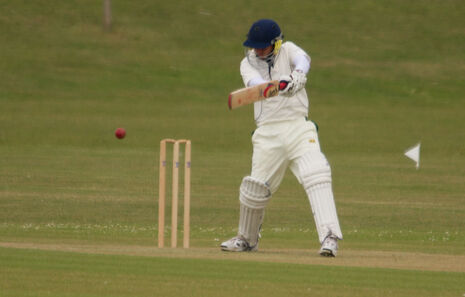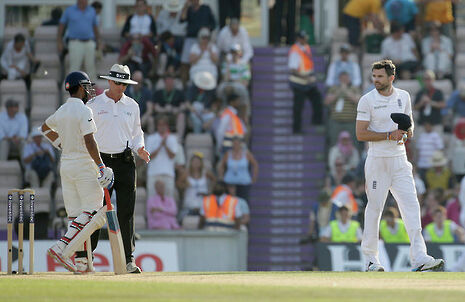Sledging In Cricket: Have They Crossed The Boundary?
If rugby is a game for barbarians played by gentlemen, and football is a game for gentlemen played by barbarians, then surely cricket is a game for gentlemen played by gentlemen?

Recent developments in the game would suggest not. England’s talismanic bowler James Anderson has been at the centre of controversy in England’s five match test series against India, where he has been accused of using aggressive, insulting language towards the Indian batsmen.
The series has thus far been tightly contested, with England bouncing back from an opening defeat to take a 2-1 lead before the final test concludes at the Oval on Tuesday. But does the fiercely competitive nature of the series justify Anderson’s comments? The fast-bowler, currently the highest wicket taker in the series so far, allegedly told Indian batsman Ravindra Jadeja to “f--- off and get in your dressing room”, branding him a “f---ing c—” and threatening to break the batsmen's teeth. Anderson narrowly avoided suspension from the final two matches of the series for an incident with Jadeja on the way to changing rooms in Lord’s, where he was accused of pushing the Indian batsman.
The concept of sledging in cricket - sniping remarks designed to gain a psychological edge over the opponent - has been around since the sport’s inception, and has become an intrinsic part of the game’s fabric. Many of the sharpest comments in the game’s history have gone down in cricketing folklore. A swinging-and-missing Viv Richards, for example, was taunted by English fast-bowler Greg Thomas who reminded Richards that “it’s red, round and weighs about five ounces, in case you were wondering”, only for Richards to bunk the ball to the boundary on the next delivery with the words: “You know what it looks like, so go and get it”.
The fierce rivalry shared between England and Australia has produced some of the finest sledges in cricketing history. During the 1990-91 Ashes Tour in Australia, English batsman Mike Atherton coolly responded to accusations of cheating from the haranguing Australian wicket-keeper Ian Healey by saying “when in Rome, dear boy…” The chirping Healey got his own back later in the series: when told to field “right under the nose” of batsman Nasser Hussain - a man well-endowed in the nasal department - he quipped that he could be standing “anywhere inside a three-mile radius”.
It would seem, therefore, that humour is a key ingredient for a successful sledge. Anderson’s remarks, on the other hand, lack any quick-tongued subtlety to really deserve a place in the sledging Bible; they’re just plain rude. From whichever angle you examine his fiery comments, the bottom line is it’s just not cricket.

So what’s the solution? The BBC Sport website has recently opened up a debate discussing the introduction of red and yellow cards into cricket, which would involve players leaving the field of play either temporarily or permanently for acts of verbal or physical indiscipline towards the opposition.
But if cricket is truly to be judged a gentleman’s game, then any on-field fracas should be settled by the gentlemen themselves, not by further layers of confusion and controversy which could spawn from such an implementation. Fraser Stewart, the MCC cricket academy and laws manager, stated that although “the issue of red and yellow cards has been discussed at a number of committee meetings… it is not something we are looking to implement at the moment. Through the MCC Spirit of Cricket we encourage cricketers to play hard and fair [and] it is important that international cricketers remember they are role models. Umpires at all levels must try to be firm in controlling behaviour and, if necessary, nipping any potential conflict in the bud."
The solution is therefore twofold: not only are the umpires required to intervene directly if they deem any remarks unsavoury, but the players themselves need to maintain an aura of professionalism and cool-headedness when the intensity of the game rises.
So when cries of “Woah Jimmy, Jimmy!” are next heard from the cricket terraces, let them be accompanied not by a tirade of colourful language, but by James Anderson doing what he does best: toppling batting orders with a masterclass of swing bowling.
 News / Caius mourns its tree-mendous loss23 December 2025
News / Caius mourns its tree-mendous loss23 December 2025 News / Cambridge welcomes UK rejoining the Erasmus scheme20 December 2025
News / Cambridge welcomes UK rejoining the Erasmus scheme20 December 2025 News / CUP announces funding scheme for under-represented academics19 December 2025
News / CUP announces funding scheme for under-represented academics19 December 2025 News / King appoints Peterhouse chaplain to Westminster Abbey22 December 2025
News / King appoints Peterhouse chaplain to Westminster Abbey22 December 2025 Interviews / Politics, your own way: Tilly Middlehurst on speaking out21 December 2025
Interviews / Politics, your own way: Tilly Middlehurst on speaking out21 December 2025








